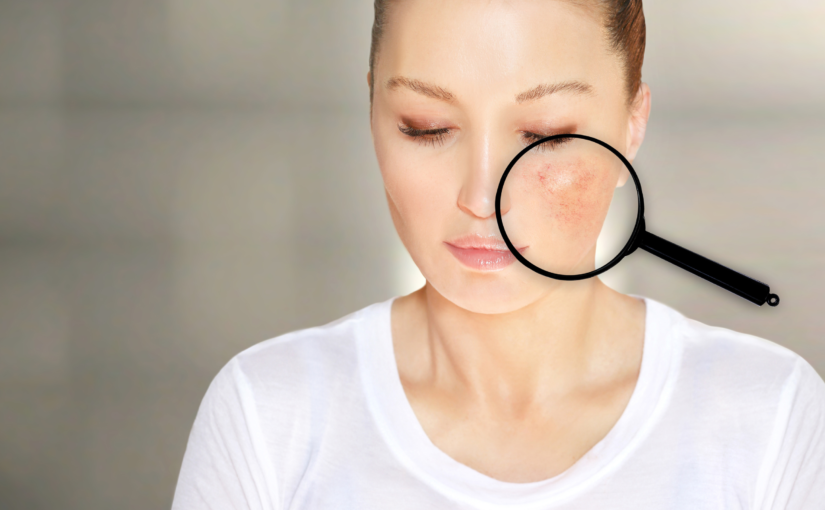What happens in a Rosacea skin?
Rosacea is an inflammatory skin condition and is defined as facial erythema. This normally presents on the central face area and can display as diffused redness, telangiectasia (visible capillaries) with a blue undertone, small bumps and pustules and in extreme cases Rhinophyma (bulbous nose).
Our bodies have an innate immune system that kicks in the defence mechanisms when needed. In rosacea skins this immune system can be in a constant state of high alert, so the slightest thing can trigger the inflammatory response. Imagine an overly sensitive car alarm that goes off when someone walks past it.
Rosacea skins also have problems turning off the inflammatory response. The specialised enzyme responsible for turning off this response in normal skins doesn’t always happen in the skin with this condition. Therefore the skin is in a constant state of inflammation. Over time this can affect our barrier function making it compromised and the skin even more reactive and sensitive, so exasperating the condition.
Symptoms of Rosacea:
- Persistent redness
- Telangiectasia (visible capillaries)
- Skin feeling hot to touch * Red, bumpy appearance, sometimes shiny
- Sore and sensitive skin
Rosacea Triggers
So with Rosacea being an inflammatory skin condition, anything that causes inflammation or vasodilation within the body, or further compromises our barrier function can increase the skin’s reactivity or cause a flare-up of the condition.
Here are a few of the common aggravating factors that can cause the skin to worsen. Note: all skins are different and what aggravates one rosacea skin may not aggravate another so below ore just examples of common factors.
- Hot foods
- Spicy foods
- Alcohol
- Exercise
- Sun exposure
- Changes in temperature (hot-cold)
- Saunas
- Incorrect skincare
- Stress
A lot of these factors are stimulants that either causes inflammation or vasodilation of the blood vessels. Add a few of these factors into a skin that is already super sensitive can cause it to flare up.
I always recommend keeping a skin diary to record everything you have eaten that day, what environment you have been in, what your mood/stress levels are, and how your skin has been that day. This way we can pinpoint anything that stands out as causing a ‘bad skin day’ and remove from your diet or lifestyle if possible. There’s is no point in trying to treat the skin from the outside if there are still many aggravating factors happening from the inside.
Rosacea Treatments
There is no definite cure for Rosacea but it can be managed. Most of the management of the symptoms will be down to you at home, but of course under my guidance and I am always here for my clients to be able to get in touch if they need me.
The following points will help you manage the condition
- Know your triggers- this will usually involve a skin diary to record your eating, lifestyle, mood, and environment, and to make a note of how your skin has behaved the day. This allows us to work out any triggers and aggravating factors.
- Skincare – With this, we will work on a seal before we heal principle. The barrier function will be the focus initially and working on restoring this with your home care, this will reduce any unnecessary sensitivity that may be making the condition worse.
- Take it slow- this applies to the skincare regime. So I will not be prescribing you a full regime to start with it will just consist of a couple of products that we can then add to as the skin shows us it can tolerate those. This way it makes it easier to identify what active your skin doesn’t like.
- Sunscreen???? so in normal cases, sunscreen will be a staple product in your skincare regime. However, I have seen in some Rosacea clients that the sunscreens can sometimes irritate the skin exasperating the condition. I might not always start you on sunscreen until your skin is showing signs of improvement and this might then just be a trial to see if it can tolerate it.
- Try to act early- don’t leave the condition to get severe before seeking out help.
- Treatments- LED is one of the most effective treatments on the market for this condition. It helps to strengthen, calm, reduce inflammation and increase hydration.
- IMPORTANT – Be patient. This is a condition that is constantly unpredictable. It can be a case of trial and error as every skin and every rosacea skin is different. Listen to your skin, treat it with care, be consistent but patient. Results don’t come overnight, and it is more important in rosacea skins than any other that we work progressively to try and make a change.
If you are dealing with any of the symptoms above and would like some help in managing the condition, get in touch. My online consultations will help me understand your skin in order to create you a skin regime to manage your symptoms, Click here to book yours.
And once we can all get back to work it would be lovely to see you in clinic for a full skin analysis.
Rebecca x


